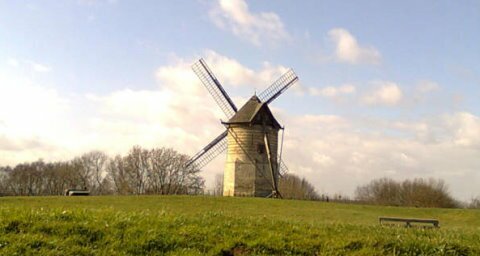Fine Dining in Northern France
Travel Tips for N-France
Nobody drives off on a foreign holiday unprepared. However, many British experience smaller and larger problems in "La Douce France" because they don't fully understand the habits or the language of the French. The author will try to help you on track, the proverb "Forewarned is forearmed" in mind. Remember that a well-informed traveler is a wise traveler.
Before you drive off, you obviously need to check: oil level, coolant fluid, windscreen washer level, tyre pressure, etc. .. But did you remember to put a Hi-Viz vest in the car? These are required by law in case of a breakdown. (In France & Belgium) And if you intend to use your mobile phone on the go, buy a handsfree set or a Bluetooth device. These will set you back around £25,00 while a fine will cost at least £90,00 (€ 100,00)
Before you drive off, you obviously need to check: oil level, coolant fluid, windscreen washer level, tyre pressure, etc. .. But did you remember to put a Hi-Viz vest in the car? These are required by law in case of a breakdown. (In France & Belgium) And if you intend to use your mobile phone on the go, buy a handsfree set or a Bluetooth device. These will set you back around £25,00 while a fine will cost at least £90,00 (€ 100,00)
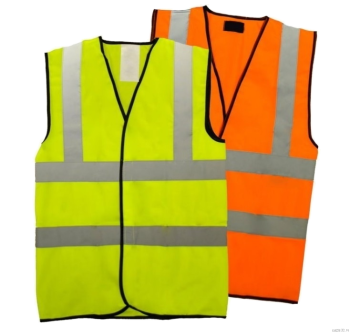
French police carry out more and more speeding controls, with high fines. It is therefore important to mind your speed. The Maximum Speed Limit in town is 50kph or 31MPH. Please note that in the proximity of schools there is often a "Zone 30" ( 30 kph = 18 MPH!) On the highway you can basically drive at 130kph (81MPH), except when it rains: then the maximum speed is limited to 110 kph (68MPH). On the other roads the speed limit is 90 kph (56MPH), when it rains it drops to 80 kph (50MPH). Also important to know is that a speed limit indicated by a traffic sign, applies until it is lifted by another traffic sign. As opposed to the Benelux, where a traffic sign applies to the next intersection and should then be repeated to remain valid, in France the speed limit remains also beyond the next crossroads!
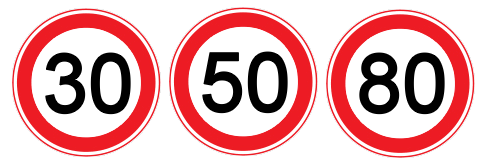
If you have to refuel in France, the lowest petrol prices are to be found in petrol stations that belong to a supermarket chain. Outside the cities you will find such "Centre Commercial" often marked. There are supermarkets such as Auchan, Carrefour, Cora, E.Leclerc. In most cases they all have their own petrol stations, that are a lot cheaper than the stations along the motorways. Most supermarket petrol stations are provided with (Maestro) bank- and credit card readers, and most of the time there are certain pumps where you can pay with cash, during opening hours. Most supermarkets have one or more ATMs under their roof, in case you want cash Euro notes.
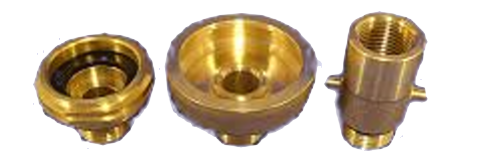
left to right : ACME (Be, De), dish (Fr, It), bayonet (Nl) LPG-adaptor
Looking at the pump in vain to find "diesel" or "LPG", it is useful to know that these fuels are called respectively "Gazole" and "GPL"... LPG car-owners are advised to bring their own French adapter, since it is different from the UK-model. In Belgium -where LPG is the cheapest in Europe- they have yet another type of nozzle. Not all petrol stations can loan you an adaptor. A small number of petrol stations are offering "E85", a green fuel based on Ethanol (alcohol). Some models by FORD, SAAB and VOLVO (so-called "duofuel") can run safely on this fuel, that is very cheap in France.
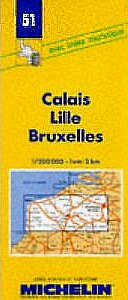
Before leaving for France, get yourself a good detailed map of the area. For most locations described confine you to Michelin No 51. This is a map with a scale of 1/200.000. This map will show 'all' roads and paths on your forays through Northern France. An additional GPS can help, but a map is essential to plan your journey and avoid blunders. If you blindly follow "LILLE" you might end up in a tiny Belgian village near the Dutch border, rather than in the capital of the Nord department, like an British coach driver experienced recently....
The main motorways in Northern France are the A16 and the A26. The A16 is sometimes called the E402 in France, and leads from Normandy to Belgium where it is called the E40. From exit 29 just off Boulogne-Sur-Mer to the Belgian border it is toll-free. The A26 runs from Calais to Reims (the capital of the Champagne region) and is nicknamed the Autoroute des Anglais, due to its many British users. Keep in mind that there are a lot of lorries on the motorways to and from the UK and that around the ferry terminals of Boulogne, Calais and Coquelles you may encounter many British drivers unaccustomed to driving on the "right" side of the road, being the "right" instead of the "left"... Especially in parking lots and roundabouts they sometimes dare to drive the wrong way around! So watch out for those scattered UK-drivers! A recent phenomenon are the 'pedestrians' on the motorways leading to Calais. Illegal immigrants trying to get to the UK use the motorways to get to their 'promised land'. They are very bold and ignorant, trying everything to get on board trucks heading for the UK.
Since the focus of these web pages is on restaurants and fine cuisine, please take note that the French tend to eat quite late in the evening. Most restaurants only open at 7.00PM, sometimes even 7.30PM. Please keep this in mind if you don't want want to wait outside with a rumbling stomach... At noon many restaurants open from 12.00AM until 2.00PM. They often serve a special "déjeuner" (lunch) menu for a reduced price. Watch for signs such as "menu 10€", you might get a fine two course meal and a beverage for that kind of money!
Monday is traditionally a day of rest for many French. Even smaller supermarkets are sometimes closed all day! And often those same supermarkets close at noon, as do the bakers and butchers. If you fancy a picnic with fresh local delicacies, make sure you have your food purchased before the magical 12:00AM!!! "Midi" (="noon") is sacred and only around 2.00pm the doors will open again. (In the large hypermarkets you can shop the whole day, sometimes until 10.00PM!) At the bakeries one can purchase freshly baked bread all day long (except during the noon-break). Even in the afternoon you can have fresh crusty baguettes, ficelles and pains. And don't forget to try the croissants, the traditional French breakfast !
With the exception of the village of Hondschoote, there are no vineyards in Northern France. But there is an abundance of breweries and beers. If you are used to drink British ales and beers, you might get a (nasty) surprise: these traditional beers often contain a much higher alcohol content than expected ...
The main motorways in Northern France are the A16 and the A26. The A16 is sometimes called the E402 in France, and leads from Normandy to Belgium where it is called the E40. From exit 29 just off Boulogne-Sur-Mer to the Belgian border it is toll-free. The A26 runs from Calais to Reims (the capital of the Champagne region) and is nicknamed the Autoroute des Anglais, due to its many British users. Keep in mind that there are a lot of lorries on the motorways to and from the UK and that around the ferry terminals of Boulogne, Calais and Coquelles you may encounter many British drivers unaccustomed to driving on the "right" side of the road, being the "right" instead of the "left"... Especially in parking lots and roundabouts they sometimes dare to drive the wrong way around! So watch out for those scattered UK-drivers! A recent phenomenon are the 'pedestrians' on the motorways leading to Calais. Illegal immigrants trying to get to the UK use the motorways to get to their 'promised land'. They are very bold and ignorant, trying everything to get on board trucks heading for the UK.
Since the focus of these web pages is on restaurants and fine cuisine, please take note that the French tend to eat quite late in the evening. Most restaurants only open at 7.00PM, sometimes even 7.30PM. Please keep this in mind if you don't want want to wait outside with a rumbling stomach... At noon many restaurants open from 12.00AM until 2.00PM. They often serve a special "déjeuner" (lunch) menu for a reduced price. Watch for signs such as "menu 10€", you might get a fine two course meal and a beverage for that kind of money!
Monday is traditionally a day of rest for many French. Even smaller supermarkets are sometimes closed all day! And often those same supermarkets close at noon, as do the bakers and butchers. If you fancy a picnic with fresh local delicacies, make sure you have your food purchased before the magical 12:00AM!!! "Midi" (="noon") is sacred and only around 2.00pm the doors will open again. (In the large hypermarkets you can shop the whole day, sometimes until 10.00PM!) At the bakeries one can purchase freshly baked bread all day long (except during the noon-break). Even in the afternoon you can have fresh crusty baguettes, ficelles and pains. And don't forget to try the croissants, the traditional French breakfast !
With the exception of the village of Hondschoote, there are no vineyards in Northern France. But there is an abundance of breweries and beers. If you are used to drink British ales and beers, you might get a (nasty) surprise: these traditional beers often contain a much higher alcohol content than expected ...
Artisan breweries include:
* Brasserie du Caou (59) Merville
* Brasserie d'Annoeullin (59) Annoeullin
* Brasserie La Choulette (59) Hordain
* Brasserie Thiriez (59) Esquelbecq
* Brasserie de Saint Germain (62) Aix-Noulette
* Brasserie Jestin (62) Samer
* Brasserie Les 3 Brasseurs (59) Lomme
* Brasserie Artésienne (62) Auchy les Mines
* Brasserie des Sources (59) Saint Amand les Eaux
* Brasserie du Pays Flamand (59) Blaringhem
* Brasserie La Dreum (59) Neuville en Avesnois .
A few miles in-land from Dunkirk and Calais are real polders, you might even encouter the odd windmill, and often you drive along canals for miles. You could almost believe that you're in the Netherlands! Well, until the 18th century, "The Netherlands" stretched out to Boulogne-Sur-Mer and the people living in this northern region still call it "Les Flandres". So do not be surprised if you encounter the Flemish Lion flag in this area: these people are proud of their roots!
